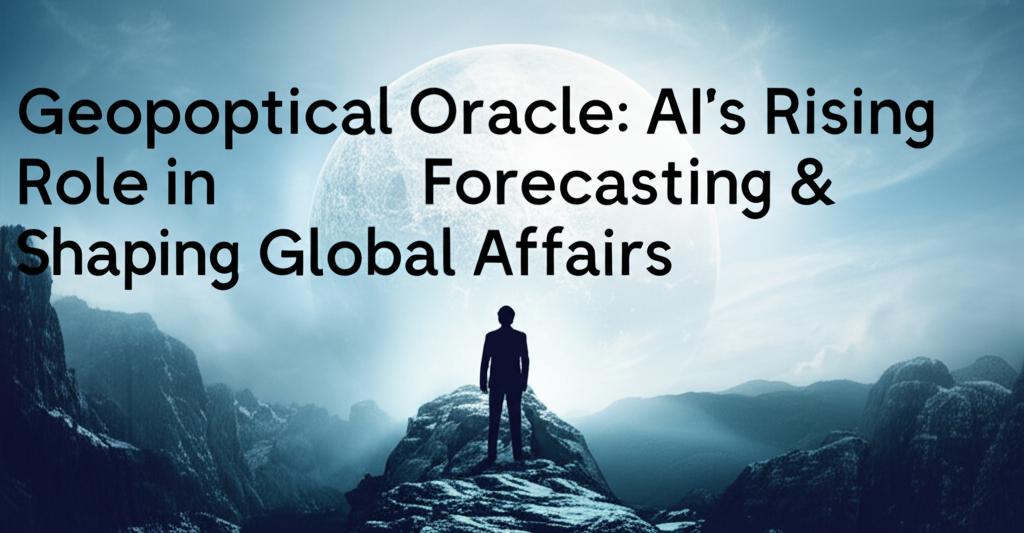The whirring gears of algorithms are increasingly audible in the once hushed halls of global diplomacy and the war rooms of geopolitical strategy. Artificial intelligence is no longer a futuristic concept; it's a present-day force actively forecasting and, in some instances, beginning to shape international affairs. This burgeoning role of AI as a "Geopolitical Oracle" presents a paradigm shift, offering unprecedented opportunities while simultaneously raising complex challenges.
At its core, AI's power lies in its ability to analyze vast quantities of data at speeds and scales surpassing human capability. Imagine AI algorithms sifting through terabytes of information – from satellite imagery and economic indicators to social media sentiment and news reports – to detect faint signals of impending political instability, potential conflict, or emerging humanitarian crises. Early warning systems, powered by machine learning, are already being developed and refined to provide policymakers with crucial lead time to act proactively rather than reactively. This predictive prowess can enable more timely diplomatic interventions, targeted aid deployment, and potentially even conflict de-escalation.
Beyond mere prediction, AI is becoming an active tool in the diplomat's arsenal. Natural Language Processing (NLP) models are assisting in real-time translation during sensitive negotiations, bridging communication gaps, and fostering understanding across linguistic divides. AI can also simulate complex geopolitical scenarios, allowing diplomats and strategists to test various policy options and anticipate potential outcomes before committing to a course of action. Furthermore, AI can help draft policy documents, analyze international treaties for potential conflicts or loopholes, and monitor global media across languages to gauge public opinion and detect disinformation campaigns.
The race for AI dominance itself has become a significant geopolitical factor. Nations leading in AI research and development stand to gain considerable economic and military advantages, potentially reshaping the global balance of power. This competition is not just about technological superiority but also about influencing the global norms and governance frameworks that will guide AI's development and deployment. International dialogues and summits are increasingly focused on establishing ethical guidelines and safety protocols for AI, addressing concerns around bias in algorithms, data privacy, accountability in AI-driven decisions, and the potential for autonomous weapons systems.
However, the rise of AI in geopolitics is not without its perils. The "black box" nature of some sophisticated AI models – where the decision-making process is not easily interpretable – can reduce trust and make accountability challenging. Algorithmic bias, stemming from skewed training data, could perpetuate or even amplify existing inequalities and prejudices on a global scale. The potential for AI-driven disinformation campaigns to sow discord and manipulate public opinion presents a significant threat to democratic processes and international stability. Moreover, the increasing reliance on AI in critical infrastructure and defense systems raises cybersecurity concerns and the specter of an AI arms race.
Developing countries, in particular, face both unique opportunities and challenges. AI can offer cost-effective tools for embassies with limited resources, facilitate remote collaboration, and provide data-driven forecasting to support informed foreign policy in fragile contexts. However, ensuring equitable access to AI technologies and preventing a widening digital divide are crucial considerations.
The integration of AI into global affairs is revolutionizing traditional diplomacy and reshaping the landscape of international relations. While it won't replace the essential human elements of negotiation, empathy, and strategic judgment, AI is undeniably becoming an indispensable tool. The challenge for the international community lies in harnessing AI's immense potential to foster peace, prevent conflicts, and strengthen cooperation, while proactively addressing the profound ethical, legal, and security considerations it brings to the world stage. The future of global affairs will undoubtedly be one where human intelligence and artificial intelligence work in tandem, navigating an increasingly complex and interconnected world.

